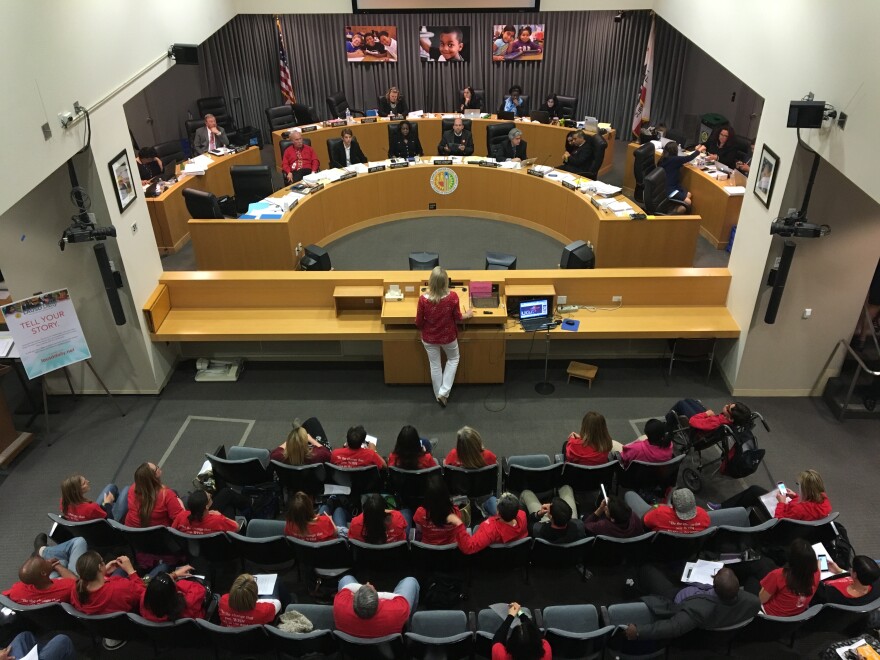This archival content was originally written for and published on KPCC.org. Keep in mind that links and images may no longer work — and references may be outdated.
LA Unified shortchanging funding for high-needs students, state says

State officials have ordered the Los Angeles Unified School District to spend hundreds of millions of more dollars on its highest-needs students, a move that is causing district officials to scramble in the last few weeks of their budget-making process.
The California Department of Education sided with advocates who calculated L.A. Unified shortchanged these vulnerable groups by $288 million this school year by, essentially, double-counting a large chunk of the funding it spent on special education services.
State officials project this “deficit” caused by the accounting practice will grow to $380 million next school year.
With just weeks left in the fiscal year, state education officials have ordered district officials to re-calculate its state-mandated plan for spending new funds to help low income, foster or English Learner students — all high-needs groups California's new funding formula directs district to target — in the upcoming 2016-17 school year.
Late Friday, school board members announced they'd hold a special meeting in closed session on Tuesday, June 7, to discuss the situation.
L.A. Unified administrators say they plan to challenge the state’s ruling, perhaps even in court. With so much up in the air, district officials said they wouldn't go into detail about how radical or minimal the changes to the budget could be.
“The decision by CDE will have to be part of the [budget] discussion, and it will create confusion," said attorney Greg McNair, L.A. Unified’s Chief Business & Compliance Counsel. "But we haven’t had enough time to figure out exactly what that looks like."
He added thatpublic hearings in the coming weeks on both the budget and its state-required Local Control Accountability Plan, where the district accounts for its spending on high-needs students, will likely feature discussion of the ruling.
Districts across California have received about $12.8 billion in additional funding over the past three years under the state’s new Local Control Funding Formula. The formula’s authors billed it as offering districts more flexibility spending the money, so long as districts could show the money was helping low income, foster and English Learner students — known as “unduplicated” students under the law.
The crux of the dispute is the large overlap between “unduplicated” kids and yet another group of vulnerable learners: special education students.
Roughly 84 percent of L.A. Unified students qualify as unduplicated.
But the formula doesn’t specifically call out special education students. Services for those students are funded by a different mix of state and federal dollars. Yet in L.A. Unified, 79 percent of the students who receive special education services also qualify as unduplicated students.
Since so many foster youth, low-income kids, and English Learners also received special education services, L.A. Unified contended that a large portion of the state funds it used to pay for special education ought to also count toward its spending on programs for unduplicated students.
But in their decision, state education officials called L.A. Unified's reading of the funding formula as “strained.” They said district officials could only count special education spending on programs specifically geared toward foster youth, low-income kids and English Learners.
“They’re really denying new and improved services to high needs students across the district,” said John Affeldt, an attorney with the nonprofit law firm and advocacy organization Public Advocates. He served alongside the ACLU of Southern California as co-counsel for the complainants.
McNair argued the state’s decision renders the flexibility promised under the new funding formula moot and will likely harm the district's general education programming.
“If we wanted wanted to hire tutors for students who are unduplicated and do a special program for those students,” said McNair, "if you took money out of the base program, where they might be taking algebra, and you take enough money out of the base program that you had to close algebra classes, then what what you’d be doing is buying yourself algebra tutors to tutor kids, but you don’t have algebra classes to put them in. That’s what we’re talking about here.”
“It’s not about the district depriving disadvantaged students of anything,” McNair added.
But Affeldt said the district has backed itself into a corner by failing to contain costs in other ways, saying they’ve agreed to increase staff salaries and benefits.
“They've gotten themselves into a corner where they’re trying to say, ‘We have to rob Peter to pay Paul and we don’t have the money for additional services for these high-needs students, so we should just be allowed to violate the law and not provide the additional services for high needs students.’”
“They’ve got other decisions,” Affeldt added, "they need to face reality about.”
If L.A. Unified does not take the matter to court, district officials would have 35 days from the May 27 decision to ask state education officials to reconsider.
